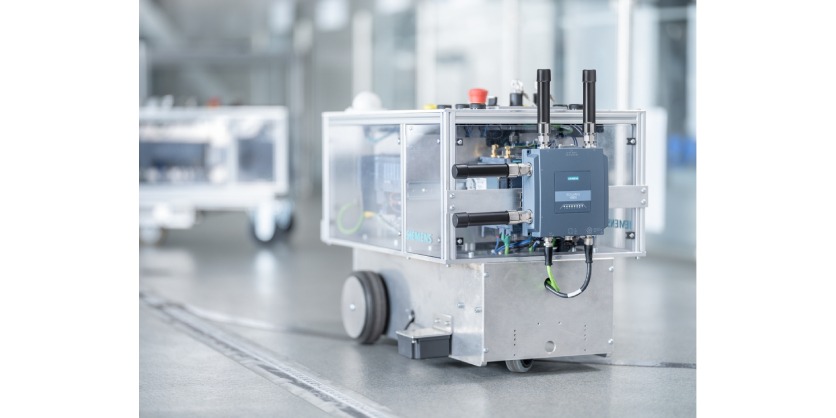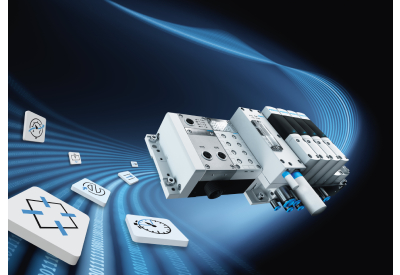Siemens Releases Industrial 5G Router in U.S. Market
November 1, 2024

- Scalance MUM856-1 connects local industrial applications to public and private 5G and 4G mobile wireless networks
- Router supports future-oriented applications such as remote access via public 5G networks or the connection of mobile devices such as automated guided vehicles (AGV’s) in industry
- Robust version in IP65 housing for use in harsh environments outside the control cabinet
- Prototypes of Siemens 5G infrastructure for private networks already in use at several sites
The Scalance MUM856-1 – the first industrial 5G router from Siemens – is now available for the U.S. market. The device connects local industrial applications to public 5G and 4G (LTE) mobile wireless networks. The router can be used to remotely monitor and service plants, machines, control elements and other industrial devices via a public 5G network flexibly and with high data transmission rates. Demand for this type of solution is growing in all industries. The device also integrates into private 5G networks. The Scalance MUM856-1 supports future-oriented applications such as mobile robots in manufacturing, autonomous vehicles in logistics or augmented reality applications for service technicians.
Featuring a robust IP65 housing, this Siemens router can also be used outside the control cabinet, for example, under harsh conditions in production or in outdoor facilities in the water industry.
To ensure the powerful connection of Ethernet-based subnetworks and automation devices, the Scalance MUM856-1 supports Release 16 of the 5G standard. This device offers high bandwidths of up to 1000 Mbps for the downlink and up to 500 Mbps for the uplink providing high throughput for data-intensive applications such as remote implementation of firmware updates. Thanks to IPv6 support, the device can also be implemented in modern communication networks. Best-in-class security functions are included to monitor data traffic and protect against unauthorized access in, for example, an integrated firewall as well as authentication of communication devices and encryption of data transmission via VPN.
Where there is no available 5G network, the device switches automatically to 4G networks. The first release version of this new Siemens router has support for U.S. Mobile Network operators as well as the CBRS spectrum; other versions with different licenses are currently in development. With the SINEMA Remote Connect management platform for VPN connections, users can securely access remote plants or machines easily – even if they are integrated in other networks. The software also offers easy management and auto-configuration of the devices.

Successful use of prototypes for private 5G networks
Along with connectivity to public networks, Scalance MUM856-1 also supports integration into private 5G campus networks. Siemens is testing this use case in its own Automotive Showroom and Test Center in a prototype of a standalone 5G test network, which is based on Siemens components. The 5G infrastructure used here comprises a 5G core, a distributed unit and several radio units. Siemens has also built another prototype of a private 5G infrastructure in its plants in Amberg and Karlsruhe, Germany. In these systems, Siemens is relying exclusively on its own independently developed products and solutions, which will be available in the U.S. market in the future.
Today, Siemens has private 5G systems running in a customer digital experience center known as MxD in Chicago.
Background info
In today’s industrial landscape in addition to the need for local wireless connectivity, there is an increasing demand for secure remote access to machines and plants. In these cases, communication is usually over long distances. Public mobile networks can be used to access devices that are located at a considerable distance.
Service technicians can connect to the machines they need to service via the mobile network while traveling, making public 5G networks an important element of remote access and remote servicing solutions. The public networks can be used to provide users with very high bandwidths in urban areas with small radio cells and high frequencies.
In rural areas, radio cells need to cover a large area, which is why lower frequencies are used. Particularly at the edges of radio cells such as LTE, there are often significant losses in terms of both the bandwidth and stability of the communication connection.
“For companies requiring reliable service in remote areas, such as in water stations or electric power sub-stations, there is a need for solutions with stable bandwidth transmission for remote servicing or video transmission,” explains Joel Green, Business Development Manager for Wireless and Remote Networks at Siemens Digital Industries. “With innovative 5G communications technologies, considerably more bandwidth with greater reliability is available at the edges of radio cells, while the average data rate for users within a radio cell increases.”
More Information
Related Story
Teradyne Robotics and Siemens Announce a Strategic Collaboration for The Siemens Experience Center at MxD to Showcase the Future of Automation in The U.S.
Teradyne Robotics, a division of Teradyne, Inc. (NASDAQ:TER) and global leader in advanced robotics solutions, is jointly developing a robotics showcase at MxD (Manufacturing x Digital) with Siemens, a global leader in industrial automation hardware and software.




